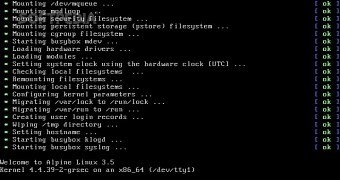Alpine Linux, the open-source security-oriented GNU/Linux distribution based on BusyBox and musl libc, has been updated earlier to version 3.5.2, the second point release to the stable 3.5 series.
Alpine Linux 3.5.2 comes one month after the release of Alpine Linux 3.5.1 and brings with it the recently released long-term supported Linux 4.4.52 kernel, as well as numerous up-to-date components, including PHP 7.0.16, lighttpd 1.4.45, Chromium 56.0.2924.76, PostgreSQL 9.6.2, nginx 1.10.3, ZoneMinder 1.30.2, and RackTables 0.20.12.
"The Alpine Linux project is pleased to announce the immediate availability of version 3.5.2 of its Alpine Linux operating system. This is a bugfix release of the v3.5 musl based branch, based on linux-4.4.52 kernels and it contains bugfixes. The full lists of changes can be found in the git log and bug tracker," reads the release announcement.
OpenSSL 1.0.2k, ownCloud 9.1.4 and Zabbix 3.2.4 are now available
Among other updates that landed in the Alpine Linux 3.5.2 ISO images, we can mention OpenSSL 1.0.2k, Zabbix 3.2.4, ownCloud 9.1.4, Borg Backup 1.0.9, GNU Screen 4.5.1, Mozilla Firefox 45.7.0 ESR, Ansible 2.2.1.0, Salt 2016.11.2, WavPack 5.1.0, Wireshark 2.2.4, Postfix Admin 3.0.2, BIND 9.10.4-P6, Vim 8.0.0329, FFMpeg 3.1.7, and WebKit2GTK+ 2.14.5.
Tcpdump 4.9.0 and many of the in-house built tools have also been included in Alpine Linux 3.5.2. Among these, we can mention acf-freeradius3 0.3.1, acf-lib 0.10.0, acf-core 0.21.0, acf-provisioning-polycom 5.5.1, acf-provisioning 0.10.0, as well as acf-openssh 0.11.2. OpenJDK 8 Update 121 and Git 2.11.1 are also present.
You can download the Alpine Linux 3.5.2 ISO images for various of the supported hardware architectures right now from our website. However, please keep in mind that these are released only for newcomers who want to install Alpine Linux on their PCs or existing users who plan on reinstalling their systems.
If you're using a healthy Alpine Linux operating system from the 3.5 stable series, then there's no need to download these ISOs. To keep your installations up to date and secure, all you have to do is to make sure all the released package versions have been installed from the distribution's stable repositories.

 14 DAY TRIAL //
14 DAY TRIAL //